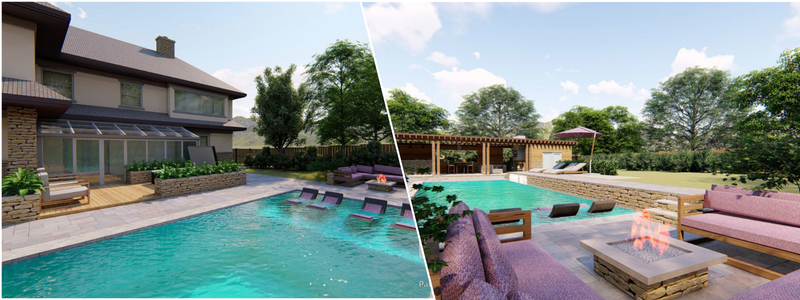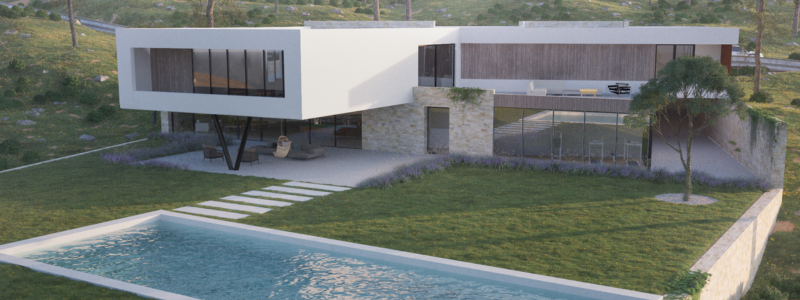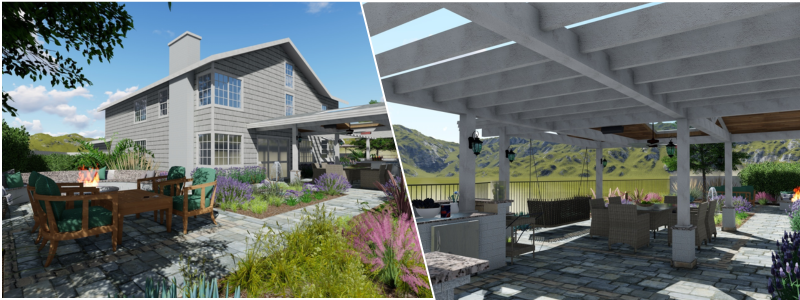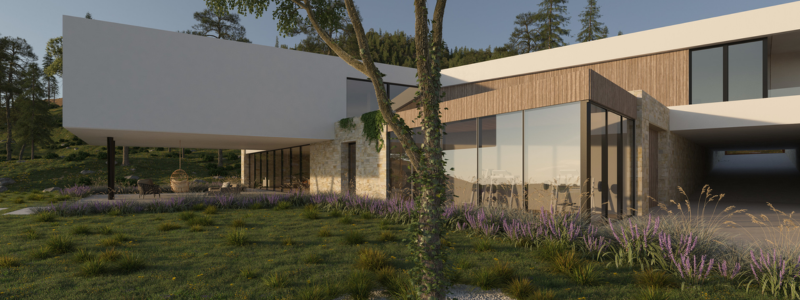3D landscape visualization and rendering services can revolutionize outdoor spaces in more ways than you can imagine. Unlike the flat, dull, and uninspiring 2D plans and drawings, there are endless and limitless possibilities when visualizing outdoor areas with the help of photorealistic 3D images. These unique services can tweak the different aspects of the project until they perfect the landscape designs for the outdoor oasis or backyard paradise entrusted to them.
 Table of contents
Table of contents
- What are 3D landscape visualization and rendering services?
- Landscape design and its importance
- Professional 3D landscape design vs. DIY landscape design
- The 3D landscape visualization and rendering process
- How landscape architects use 3D landscape visualization and rendering services
- Benefits of 3D landscape visualization and rendering services
- How Cad Crowd can help
What are 3D landscape visualization and rendering services?
3D landscape visualization and rendering services are cutting-edge approaches to creating gorgeous outdoor areas. Real estate marketers and professionals, landscape architects, and homeowners alike take advantage of these services for many reasons. These include the following:
- 3D landscape visualization and rendering services easily allow more creative collaboration between clients and landscape designers or architects since everyone can see and view what the outdoor space, shrubs, furniture, and elements will look like in natural life way before they are installed or added to the area.
- The ability to visualize landscape projects in 3D makes it easier to plan for the project and guarantees that every single base is covered.
- Marketing space that isn’t even built yet is almost impossible. 3D renderings can help fill this gap and allow salespeople and marketers to showcase the precise real-life appearance of outdoor spaces upon completion.
RELATED: Why landscape rendering and visualization is important for company landscaping projects
Landscape design and its importance
Landscape designs depict what and how landscapes will look upon completion, making checking how the elements blend easier. They include details like plants, water features, hardscaping, lighting, and other factors and elements arranged functionally and harmoniously. In addition, landscape designs are a comprehensive plan to create an outdoor area that caters to specific goals and needs.
It’s not a secret that landscaping is a form of art that turns outdoor areas into sustainable, functional, and beautiful spaces. However, everything begins with 3D landscape visualization and rendering before the actual elements of the landscaping project are laid out. It doesn’t matter if the client wants to improve the curb appeal of their property, create a brand new outdoor living space, or enhance the property’s value; a carefully planned and designed landscape can make a big difference.
Here are the top reasons why landscape designs are needed:
- To communicate better with contractors
Freelance landscape design services are an effective tool for communicating with contractors and other experts involved in landscape construction. It offers an accurate, concise, and precise depiction of what should be done to reduce the risk of errors and misinterpretations.
- To allocate and plan resources accordingly
Landscape design offers a plan for creating the landscape, including the plants, materials, and other aspects required in the project. This guarantees that the project will stick to the budget and that all essential resources will be available when and as needed.
- To envision the completed project
Landscape design provides an accurate, detailed, and precise representation of the appearance of the finished landscape. This simplifies envisioning how the different elements blend to ensure the completed project meets expectations.
RELATED: What does it cost to hire a landscape design architect expert for your company?

Professional 3D landscape design vs. DIY landscape design
It’s no surprise that many people consider the DIY approach in their landscape design. Although many 3D landscape visualization and rendering services come with very reasonable prices, some people decide to do everything on their own at first. Sadly, after a few weeks, many face the harsh reality once they realize how challenging it is to learn and master the art of using landscape design services. While it may seem more flexible and more affordable for you to opt for DIY landscape design, the truth is that a steep learning curve is involved, and trying to figure out the software may end up costing you not just more time but even more stress so that you can polish the skills required to come up with top of the line 3D renderings.
Professional 3D landscape visualization and rendering services have many years of experience that non-professionals need help replicating quickly. For a reasonable price, they can put their expertise to work on your behalf to create something stunning, saving you from the temptation to pull your hair out of frustration to learn how to create a landscape design from the ground up.
The 3D landscape visualization and rendering process

Landscapes are never made overnight. The process involves several strategic steps to achieve the right look and feel the client aims for. These include the following:
1. Measurement and analysis of the site or space
A site analysis entails studying the existing conditions of the site or space, including its existing vegetation, soil type, topography, shape, and size. These details are critical to determining the placement of different elements, such as the structures, plants, and trees, together with the overall flow and layout of the area. The designer will also measure the site and record the dimensions to confirm that the space can accommodate the proposed design.
2. Conceptual design
After completing the site analysis, the designer will develop a conceptual design that will outline the overall feel and look of the landscape. It includes the placement of the different elements like structures, plants, and trees, together with the overall flow and layout of the space. This conceptual design also includes details regarding the size and type of elements and their orientation and placement.
3. 3D modeling
Following the approval of the conceptual design, the designer will now develop a 3D landscape model. It involves using specialized software to create the landscape’s virtual model. This is a critical phase as it ensures the accuracy of the design and the proper fitting and blending of all the elements involved.
4. Animations and renderings
Once the landscape’s 3D model is finished, the designer will create animations and renderings to offer a more accurate and detailed depiction. It includes animated walkthroughs and still images that provide a clear view and understanding of the landscape design from various angles and perspectives.
RELATED: 3D flythrough & 3D architectural animations, costs, rates, and pricing for companies
How landscape architects use 3D landscape visualization and rendering services

3D landscape visualization and rendering services open many doors of opportunities for landscape architects and designers as well as horticulturalists. With the help of these services, they no longer need to leave their office charges to try out various landscape features, look at the elevation of the terrain from multiple angles, or see what the designs look like under numerous lighting conditions. Just imagine how much easier and faster client buy-in will be if you give them a chance to directly envision the designs’ appearance after completion.
The following are some of the ways that landscape architects use and take advantage of 3D landscape visualization and rendering services:
- It is promotional and marketing material on their social media channels and websites.
- They experiment with various materials and layouts in their designs easily, quickly, and affordably.
- Getting a better virtual sense of the designs allows them to focus on finer details that would have easily wasted time.
Accessing extensive 3D plant libraries from the available visualization tools can save money compared to maintaining vast stocks of physical plants.
RELATED: How landscape design services can help companies with 3D landscape design projects
Benefits of 3D landscape visualization and rendering services
The following are the top benefits of 3D landscape visualization and rendering services:
- Incorporate eye-catching 3D visuals in marketing campaigns to attract more new clients
If you’re a client, which company would you choose? A company with a dull social media and website with poorly taken and washed out images, or a company whose social media and website use 3D landscape materials for marketing that linger in their memory and pop out of the page?
The right 3D and 2D visualizations of your work can entice potential clients, leaving them with a lasting good impression that will set you apart from your competition. If samples of your past projects were limited, you can also use 3D landscape visualization and rendering services to show your skills and what you can do to ensure everything looks life-like.
- Establish and grow a reputation
Your company and team can easily stand out as several professionals in your industry using cutting-edge renderings in the workflow. This state-of-the-art technology shows your commitment and dedication to excellence, making you stand out from competitors who rely on traditional methods such as 2D or flat designs.
- Supercharge collaborative workflow
3D landscape visualization and rendering services allow clearer and more seamless communication with clients, suppliers, and the team since they help everyone quickly glimpse the final project’s shared vision. The perspective helps create a more efficient and free-flowing environment where ideas create a final product that exceeds the customer’s expectations.

RELATED: What are architectural 3D visualization costs, service fees & rates for companies?
How Cad Crowd can help
Cad Crowd can connect you with the best 3D landscape visualization and rendering services if you are ready to revolutionize outdoor spaces. Contact us now for a free quote to get started.

I love how you highlighted the role of 3D rendering in enhancing client communication! Visual representations help bridge the gap between designers and clients, making it easier to convey ideas and ensure everyone is on the same page.